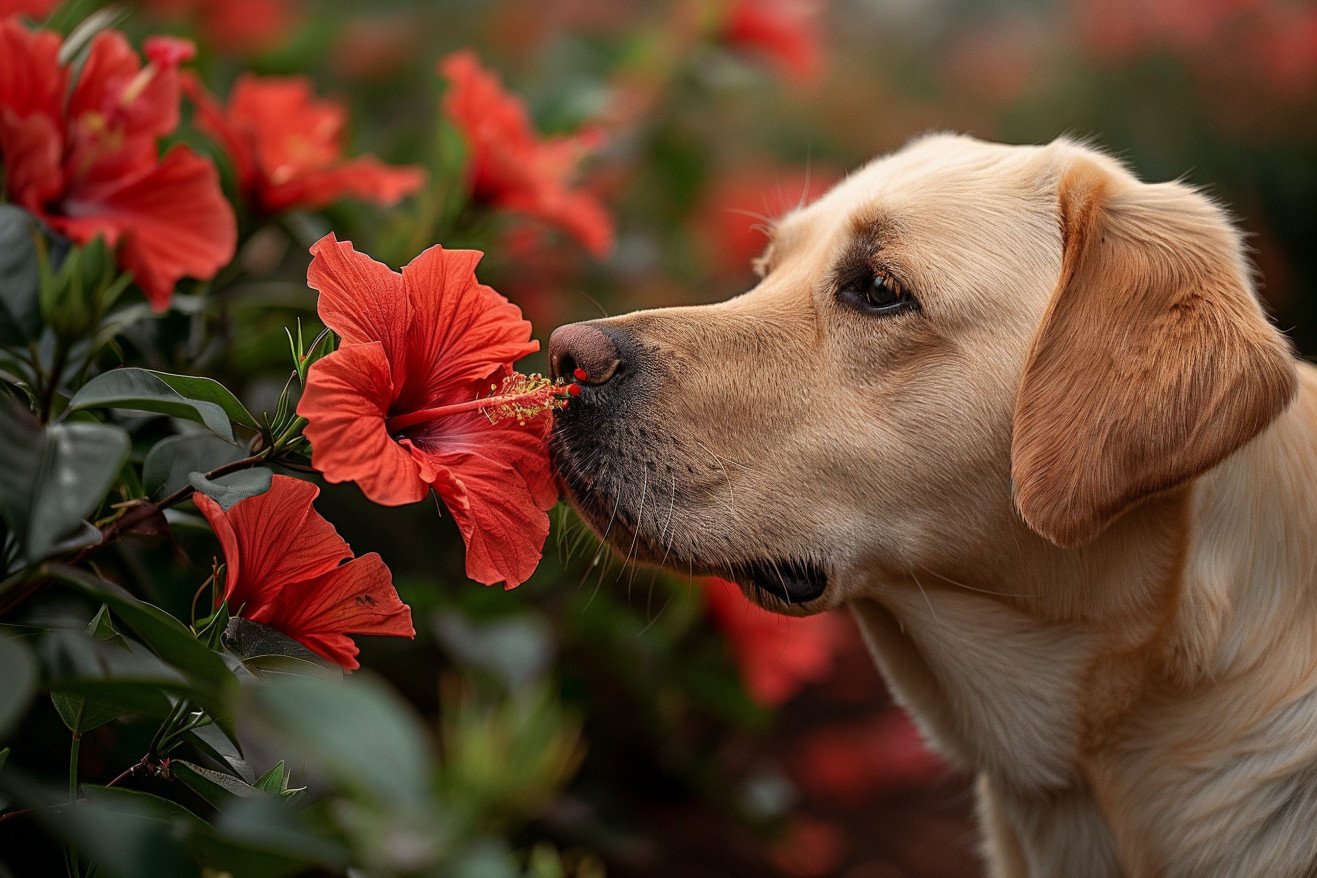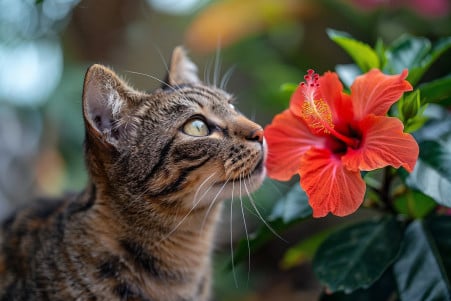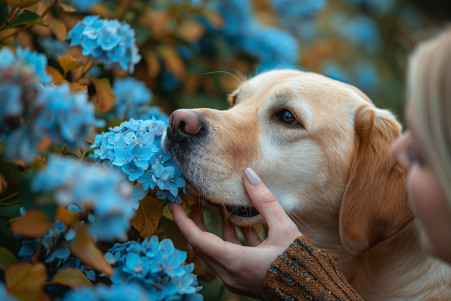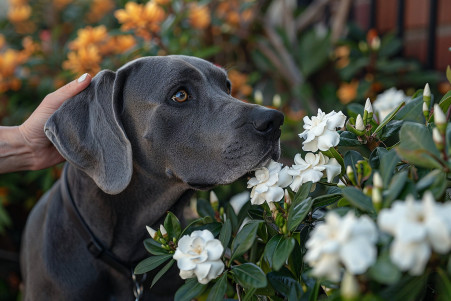Can Dogs Eat Hibiscus? Potential Dangers Explained
27 March 2024 • Updated 27 March 2024

The bright and beautiful hibiscus flower is a lovely addition to any garden, but pet parents may be concerned about the safety of this plant for their dogs. Hibiscus is not poisonous to dogs, but it can cause mild stomach upset and other issues if eaten in large amounts. Hibiscus flowers, leaves, and stems are all non-toxic to dogs, but it's important to be aware of the potential for a laxative effect and the risk of an obstruction if your dog eats too much.
To help you understand what this means for your dog, this article will take a closer look at the research and expert opinions on the topic. By examining the research on the toxicity, nutritional content, and potential effects of hibiscus, you can learn what you need to know to make sure your dog stays safe and healthy while enjoying these beautiful plants.
Is hibiscus poisonous to dogs?
Toxic vs. Non-Toxic Hibiscus Species for Dogs
Most hibiscus species are non-toxic or only mildly toxic to dogs, with the exception of the Rose of Sharon (Hibiscus syriacus), which can be more toxic if consumed in large quantities. The Chinese Hibiscus and Roselle Hibiscus species are generally safe, although dogs can still experience vomiting and diarrhea if they eat too much.
Although the exact cause of the toxicity of some hibiscus species is not known, the presence of unknown compounds is thought to be responsible. It's important to thoroughly research the specific hibiscus species and its toxicity if you're planning to plant a dog-friendly garden, as toxicity can differ even within the same species.
For dog owners looking for safer flowering plants, species such as catmint (Nepeta) are a great option. Not only is catmint safe for pets, but it's also strong enough to withstand the occasional roughhousing from dogs. By choosing the right plants and being aware of potential dangers, you can create a garden that's both beautiful and safe for your pet.
Signs and Severity of Hibiscus Poisoning in Dogs
The symptoms of hibiscus poisoning in dogs can range from mild stomach upset to more severe issues. The ASPCA lists some of the mild symptoms of hibiscus poisoning in dogs as vomiting, diarrhea, nausea, and loss of appetite. The ASPCA notes that hibiscus plants and flowers are toxic to dogs.
More severe symptoms can include excessive drooling, lethargy, weakness, changes in urination or gum color, and even internal bleeding or organ damage. According to Greg.app, the Scarlet Hibiscus (Hibiscus syriacus) is especially known to cause these more severe symptoms. The severity of the symptoms will depend on the amount of hibiscus consumed and the specific type of hibiscus.
While fatalities are rare, WagWalking warns that it's important for dogs to receive veterinary care as soon as possible if they experience concerning symptoms after consuming hibiscus. It's also important to watch for dehydration, as the gastrointestinal symptoms can cause dogs to lose fluids quickly.
First Aid and Veterinary Treatment for Hibiscus Poisoning
If a dog has ingested hibiscus, the first step is to move them away from the plant and collect any remaining plant material or photos to show the veterinarian. According to Cornell University's College of Veterinary Medicine, it's crucial to contact a veterinarian or pet poison control hotline immediately for professional guidance on the appropriate first aid steps.
Do not attempt to induce vomiting at home unless specifically instructed by a veterinary professional, as this may not always be the right course of action. As noted by LoveYourDog.com, veterinary treatment may involve inducing vomiting, providing fluid therapy to prevent dehydration, administering medications for nausea or pain, and supportive care.
With prompt treatment, WagWalking states that most dogs recover fully from hibiscus poisoning within a few days. However, severe cases may require more extensive veterinary care to address any internal damage or complications.
Things That Impact How Toxic Hibiscus Is to Dogs
The type of hibiscus and the amount that a dog ingests both play a role in how toxic hibiscus is to dogs. Cuteness.com explains that the amino acid asparagine is the most toxic part of the hibiscus plant, and it can cause gastrointestinal distress and other symptoms in dogs. In addition, certain parts of the hibiscus plant, such as the roots, can have higher levels of toxic substances and therefore be more dangerous to dogs, according to Francis W Bangayan on Medium.
A dog's age, size, and health can also impact how sensitive they are to hibiscus and how they react to ingesting it. Cleverdogcare.com even notes that hibiscus can be fatal in some cases, so it's important to know what impacts toxicity. There may also be environmental factors that impact how toxic hibiscus is to dogs, such as whether the plant has been treated with pesticides or herbicides.
It's important to know the type of hibiscus that a dog has ingested and to monitor them for symptoms of poisoning. This will help pet owners understand how serious a potential poisoning is. Knowing these things will also help pet owners prevent poisoning and other issues with their dogs.
How to Avoid Hibiscus Poisoning and Protect Your Dog
The most effective way to avoid hibiscus poisoning in dogs is to prevent them from coming into contact with the plant by using physical barriers or careful landscaping. According to Florissa, all types of hibiscus are toxic to dogs, so it's important to make sure that they aren't planted in a dog-friendly garden.
Instead, dog owners can replace toxic hibiscus plants with dog-safe options like catmint (Nepeta). As mentioned by Great Garden Plants, catmint is a perennial that blooms for more than 5 months and has sturdy stems that can withstand a dog's roughhousing. In addition, the plant's aromatic leaves may attract dogs.
Of course, supervision is important—LoveYourDog.com advises that dogs be watched closely when they're outside and that they be discouraged from eating any part of the hibiscus plant. It's also important to make sure that other family members and guests are aware of the dangers of hibiscus so that they can be sure to watch out for dogs.
To get more specific advice, dog owners should consult with a veterinarian or horticulturist to get help in creating a dog-safe garden. However, these steps can help ensure that dogs can safely enjoy the outdoors without being exposed to danger.
Conclusion: How to Safely Enjoy Hibiscus with Dogs
Although most hibiscus plants are non-toxic or only slightly toxic to dogs, it's important to understand the potential dangers and take steps to protect your pet. By learning about specific hibiscus species, supervising your dog's exposure to hibiscus, and consulting with experts as needed, you can ensure that you and your dog can both enjoy the presence of hibiscus in your home or garden.
It's important to seek immediate veterinary care and follow up with appropriate treatment if your dog ingests hibiscus, as more serious complications can occur in rare cases. However, with the right information and precautions, hibiscus and dogs can safely coexist.


